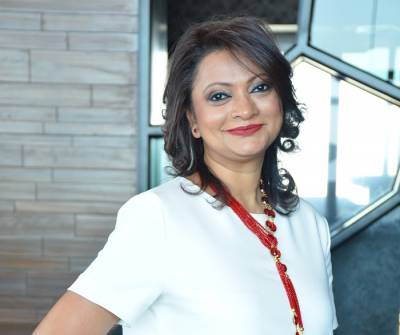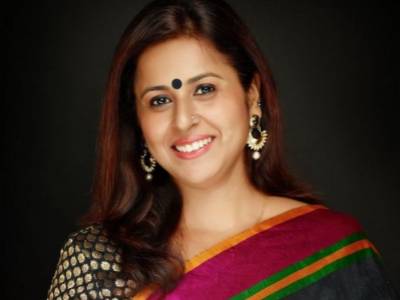The W Suite | Women leaders come under unwanted scrutiny: Sona Mazumdar
Diversity in the workforce has become a necessity today, and more so in the leadership positions. It can’t be denied that women bring a high level of creativity and empathy while solving problems and handling crises. Women leaders bring to the table a different level of dexterity.
AdGully’s ‘The W-Suite’ series features interactions with influential women leaders in India, who share some deep insights on what being a woman leader means in India’s business landscape, the mantras to succeed, achieving work-life balance, pay parity and much more.
As Chief Partnership Officer at Kidzania India, Sona Mazumdar is responsible for customising solutions for clients to ensure long term business objectives of both clients as well as KidZania are met. She is responsible for nurturing and growing partner relationships. All this is achieved by working closely with cross-functional and multi-geographical teams. She leads regional teams under her and helps them develop and execute strategies to ensure growth and achievement of key accounts (regional/ national) and revenue objectives.
Mazumdar’s responsibilities include collaborations with internal, cross market/ APAC teams to ensure product improvement via knowledge transfer and process/ client relationship improvement. She proactively manages the entire sponsorship sales process within each opportunity and initiative to ensure all financial and marketing goals are met.
She implements holistic sales strategies to churn out the maximum revenue potential from clients, create mutually beneficial long-term relations with every partner and add value to the organisation. Her expertise lies in combining technical and branding knowledge, coupled with people management skills to decipher analytical data regarding marketing campaign performance and thereby suggest improvements. She commands exceptional people and relationship management skills.
How would you define today’s woman leader?
Today’s woman leader is all of us – you, me, the woman who is helping you at home, a working single mother, a colleague of yours, all of us. She is passionate, a woman of strong character, one who has opinions and isn’t afraid to voice them. She is also someone who builds other men and women up as well and finds it empowering to do so.
What are the foremost attributes that women leaders in today’s business ecosystem must possess?
One must have empathy towards others regardless of their gender. One must be so committed to their job that compromising would be out of the question. Other attributes would be, to be result-oriented, effective time management, to balance aggressiveness with assertiveness, team-playing, accessibility and the willingness to help those who need your assistance and knowledge to a shared benefit. Women must also have their own voice and not be afraid to let their opinions be heard and analysed as long as they’re being true to themselves.
Despite the qualifications, aptitude and experience, why do you think we don’t see the expected number of women business leaders, especially when it comes to boardroom decision-making?
I think this comes from a deep-rooted belief that women don’t make good leaders, or to put it accurately, it’s always accepted without reason that women make their decisions based on emotions and not practicality. Through the years, we’ve all seen some men, (the key word here being some) actively put in efforts to put a woman down and casually brush her opinions off to a point that she believes she is irrelevant and incapable to lead a meeting and take the bigger decisions. Women leaders come under unwanted scrutiny and are expected to prove their worth a greater number of times than their male counterparts. There are pre-conceived notions about the multiple roles she plays at a given point of time, thereby questioning her ability and commitment towards her company.
What more do Indian corporates need to do to encourage and groom women leaders?
Seeing that the working population has more women than men these days, corporates need to be fair in their approach. They can have flexible working hours, considering the workforce includes mothers or women who have a person that is dependent on them and also keep the option open to remote working. Also, they should not be sexist and personally intrusive by asking questions like “Are you going to marry any time soon?” or “Will you be having a baby soon?” Considering a few women could possibly be expectant mothers, recruiters must have reasonable leaves and also accept those who have taken a sabbatical from work with open arms. One’s efficiency and effectiveness cannot be judged by them taking time off from work or being mothers or expectant mothers. So, I think that needs to change.
According to you, what are the Do’s and Don’ts for today’s women to break through the glass ceiling?
The Do’s are definitely contributing to the company with the best one can offer in terms of knowledge, passion and enthusiasm. You should be consistent and identify your mentors early on in your career. Establishing yourself as someone who puts the company’s interest first, and delivers for its growth, is an impressive trait too.
The don’ts would be: Do not take a short cut of dubious means to reach the top… the faster you climb, the harder you fall. Don’t let anyone take your thoughts and make them their own by taking credit for what you’ve done and accomplished. Don’t let one failure make you forget all that worked out for you or could potentially work out.
How acute is the gender pay gap issue in India today? What needs to be done to address this in an effective manner?
There is most definitely a pay scale disparity in some organisations. HR departments, along with the leadership teams, need to take cognizance of this and address the elephant in the room, rather than having a disgruntled employee finding out from other sources. Pay need not necessarily be in terms of money, but women employees value some perks more than money can buy, that is, flexi-timing, a day care/ crèche at the workplace, if travel is involved for the employee (allowing the baby and nanny to travel) until the baby is 1 year old, transportation facilities, ensuring no discrimination during an appraisal cycle when an employee might have gone on maternity leave.
Do you think the leadership effectiveness of women is higher than men? Why?
I do not think so. Men and women have different leadership styles and each one has strong merits. An organisation needs to have a good balance of the two to maintain a healthy organisation environment.
What are the five most effective lessons that you have learned as a woman leader?
- Women are natural nurturers, so they are always looking at ways – direct or indirect – to help someone out. Team building abilities are also great with women.
- Knowing where your strengths lie and to balance it out by working harder on things that aren’t necessarily your area of expertise.
- Time management and the sense of urgency is higher is women than in men.
- Women leaders are inherent planners, so they end up being good strategists.
- High tenacity and self-esteem along with self-belief is also high in women, which makes them strong and powerful leaders.
How challenging has it been for you to maintain a balance between career goals and family responsibilities? What is your mantra to maintain that balance?
Personally, barring the two times I have come back from my maternity leaves where there was a small blip in my career; I have had the good fortune of a very supportive family set up comprising of my husband, mother-in-law, parents and the support staff who have helped me pursue my professional aspirations. My work involves a lot of travel, so between me and my husband, we ensure that both of us are not travelling at the same point of time. I work hard and play hard, so vacations for me and my family are an absolute must and non-negotiable and that’s what keeps me going. My current organisation allows me to maintain this balance wonderfully and I am grateful for that.
How prevalent are the instances of sexual harassment in work places in India? What should the industry collectively do to tackle such a serious issue?
Sexual harassment is very much prevalent in some industries more than the others, where sometimes it is viewed as ‘normal’. I feel there should be bodies, internal as well as external, or audits, which should take place to curtail and end this kind of behaviour. Some people more than others (no gender bias here), find it burdensome to talk about a terrible experience like that and put up with it, thinking if they talked about it or lodged a complaint, it would ruin their career or they could lose their job. We should discourage even the tiniest action that could lead to harassment and encourage co-workers to speak up, if and when they have an unfortunate experience.





















Share
Facebook
YouTube
Tweet
Twitter
LinkedIn